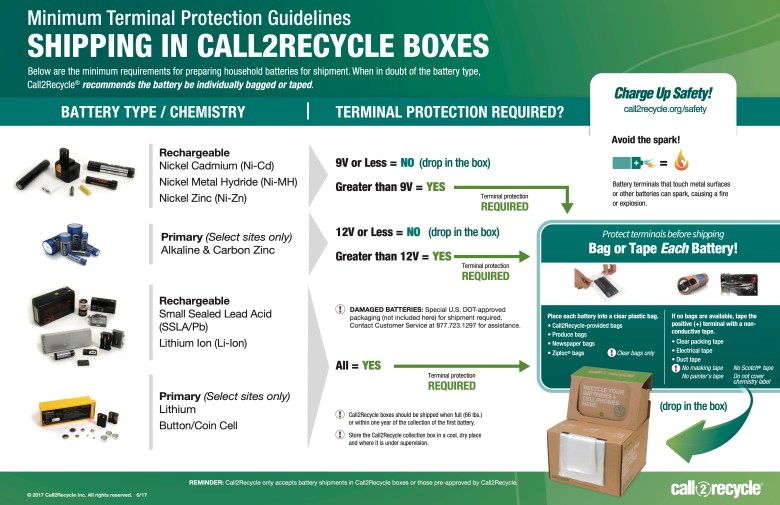UPDATE: This story has been updated to reflect additions to Call2Recycle’s online map tool. The headline was also amended to clarify that the program is the first extended producer responsibility, or battery maker-funded, program to accept all small batteries, rather than the first-ever program to do so.
If you happen to have a box somewhere full of used-up AAs from kids’ toys, AAAs from the TV remote and a random watch battery or two, now is your time to shine.
As of Nov. 1, consumers in the District will be able to drop off home-use batteries of any kind for free at sites around the city, where they’ll be picked up for recycling.
It’s the first battery recycling program in the U.S. funded by battery makers that accepts both rechargeable and single-use batteries, said Carin Stuart, a spokesperson with nonprofit Call2Recycle, which is partnering with the D.C. Department of Energy and Environment to launch the initiative. Previously, the organization’s collection sites in the District could only pick up rechargeable batteries.
“As batteries get larger, and they’re found in more and more devices, the need to safely manage them at end of life rapidly increases,” said Stuart, who works as Call2Recycle’s steward relations manager. “Battery recycling creates a circular economy, reduces the need to mine virgin materials — we can process those and reclaim those materials and put them back into new products.”

As part of the new program, Stuart said, people can drop off any rechargeable or single-use battery that’s under 11 pounds, or less than 300 watt-hours for lithium-ion batteries. Some need to have tape over the ends or be wrapped in a plastic bag. Car batteries can’t be accepted; neither can e-bike batteries, but many bike shops around the city have their own drop-offs for those.
“The focus is on what you would call a portable battery,” Stuart said. “[It] pretty much covers anything that the consumer is gonna be walking around with, but not riding on or uninstalling.”
Battery producer companies pay for the recycling program, as they do in many jurisdictions around the country. Stuart said Call2Recycle currently has 22 partner sites on board across the District, which will host specially lined boxes in which batteries can safely travel to recycling facilities around the country.
Call2Recycle hosts an online map of participating sites where anyone can drop batteries. That can be found at www.call2recycle.org/locator. As of Nov. 1, the map showed 16 battery drop-off sites within D.C. borders. Only one of them — Trek Bicycle DC Skyland — is east of the Anacostia River.
D.C. law requires the initiative to include at least 70 sites “with a reasonable geographic spread … across all eight wards, taking into account accessibility to public transit.” The D.C. Council first established the need for a collection and recycling program funded by battery makers nearly three years ago, but used emergency legislation in 2022 to push back the implementation.
The same D.C. law that established the recycling program — the Zero Waste Omnibus Amendment Act of 2020 — also made it illegal to knowingly throw batteries in the trash. For residents, that part of the law went into effect Aug. 1 of this year.
Tossing batteries and having them end up in landfills creates some serious risks. Lithium batteries, especially large ones, can cause fires. Others, including common alkaline and zinc-carbon batteries, can leach toxic chemicals into soil or groundwater.
“The most common issues with battery recycling stem from a lack of general awareness of the proper disposal,” Stuart said. “We’re seeing a growing awareness in terms of battery recycling that’s crucial to preventing fires and protecting people, property and the environment.”



Trek Bikes Skyland is listed as a dropoff location located in Ward 7…
Hi Bikr – this is Kayla, the author of the piece. Thanks for bringing this to our attention! We updated the piece to reflect what the Call2Recycle map now says, as of Nov. 1.
DC is not the first to offer free battery recycling of all small batteries, maybe the first through Call2Recycle. Fauquier County Environmental Services in Virgina has had a free battery recycling program, accepting all household batteries for all Fauquier County Residents since 2007.